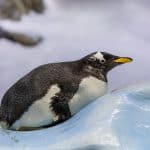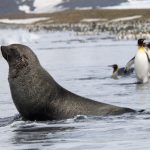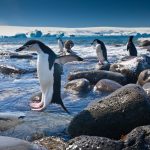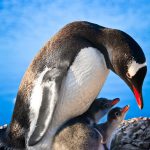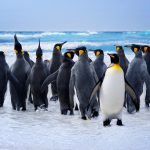Physically yes – they are just birds and not toxic to humans. However, they are illegal to even touch in many countries so eating them would be impossible.
Where Can You Eat Penguins?
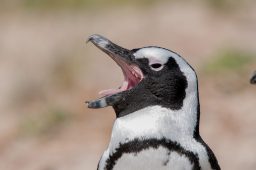
In virtually all countries of the world – you can’t legally catch or eat penguins.
All 18 species of penguin are protected from hunting and egg collecting – because they are threatened in some way by human activity and climate change. As a result, there would be nowhere where you could go find yourself any penguins to eat – and they certainly couldn’t be on any menu anywhere.
In the past – before we as humans truly understood the value of the natural world and how unique some species were – people ate penguins. Just like people shot the passenger pigeon, ate Galapagos tortoises, and killed the dodo. Humans just treated all wild animals as a resource for themselves – not considering penguins as individuals with their own purpose and needs.
Now we have a certain level of ethics when it comes to interacting with and protecting wildlife. We can’t be seen to be using animals for our own gain – especially if that animal is endangered or considered vulnerable. So even if penguins did appear on a menu someplace – can you eat penguins with a clear conscience anyway?
What Do Penguins Taste Like?
As you would imagine – they taste like fish! With a body full of fish oils and with muscles made from fish proteins – there wasn’t anything else they COULD taste like. So NO penguins don’t taste like chicken.
Stories from the past detail how much cooking and processing they needed to become palatable – even to half-starved and nutritionally depleted sailors. People actively avoided eating them if there was anything else – but when needed – they were stored heavily salted.
What Animals Do Eat Penguins?
There are quite a lot of animals who absolutely love eating penguins. They are a rich source of fat and protein for a wide range of predators around Antarctica – and as fat and protein are very important for staying warm in the cold oceans – and staying active – penguins are a great option.
Leopard Seals: This ferocious hunter is one of the penguin’s biggest enemies
Fur Seals: Found across the ranges of many penguin species – this family of seals are very capable hunters
Sea Lions: These agile predators hunt penguins off the coasts of landmasses – and sometimes on land too
Orcas: These very clever and canny mammals often feast on the glut of baby chicks
Sharks: Many species of shark will take penguins while out in the open ocean
Skuas & Petrels: Large predatory seabirds will take small penguins and chicks while on land
Can You Eat Penguin Eggs?
According to stories, penguin eggs are more appetizing than penguins themselves. However, they aren’t like ordinary eggs that we humans are used to. Firstly – their albumen (the white part) doesn’t cook through white – it stays clear. Looks like you are eating a clear Jell-O. And secondly – the yolk never really ‘sets’ and can be bright orange to red in color.
Penguin eggs vary in color from white through pale green to soft blues. They also vary in shape and weight – from 2oz (with Adelie Penguins) to 18oz (for Emperor Penguins). Virtually all penguins lay two eggs a year – with just the King and Emperor penguins laying a single egg only. Not too productive for commercial farming.
Do Penguins Eat Wood?
Penguins, known for their love for fish, are unlikely to be interested in consuming wood. However, the question arises whether will beavers consume treated wood. Beavers, renowned for their ability to fell trees, do have a penchant for wood, but their preference usually leans towards natural, untreated bark and timber found in their habitats.
Why Are Penguins A Protected Species?
Penguins are flightless birds with no real fear of land predators – and so hunting them as a human was all too easy. In the past, the oil found in penguins was highly valued (just like with whales) although penguins were easier and cheaper to process than a 20 meter long, 80 tonne whale.
Hunters would set up camps on islands and process thousands at a time – leaving some colonies completely penguin-less. Whole areas were cleared of penguins – most famously the Macquarie Islands where over 2 million were estimated to have been killed during a 30-year period.
Needless to say, when conservationists started looking into populations, ecology, and wide-scale effects of species loss on habitats, this had to stop. Penguins are now completely protected from harm across the Antarctic and even touching them can warrant a fine. Since 1959 the Antarctic Treaty makes it “illegal to harm, or in any way interfere with a penguin or its eggs” and many countries have enforced their own additional rules.
Hopefully, this will eventually allow numbers to bounce back – and the populations become stable – along with the whole ecosystem. Several penguins are also listed as endangered – with conservation efforts in place to bolster their numbers.
Let’s hope it works.

